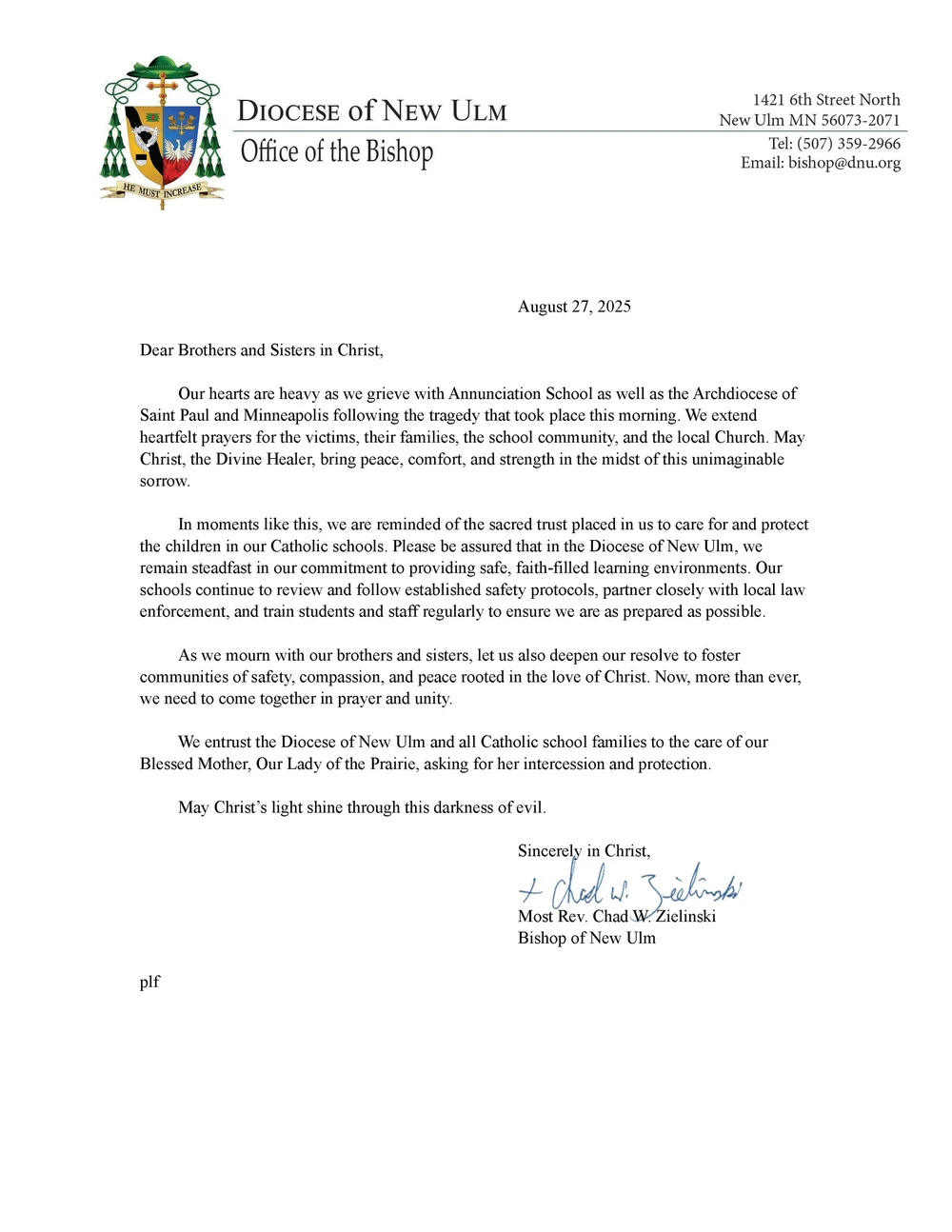Browsing News Entries
A Catholic Understanding of Immigration by Bishop Andrew Cozzens of the Diocese of Crookston, MN
Posted on 11/24/2025 12:42 PM (Local News - Diocese of New Ulm)
CROOKSTON, MN - On Nov. 21, 2025, the “Lend Us Your Heart” section on the Diocese of Crookston’s website posted a message by Bishop Andrew Cozzens concerning the issue of immigration titled “A Catholic Understanding of Immigration.”
It reads:
“Our citizenship is in heaven, and from it we await a Savior, the Lord Jesus Christ” (Phil 3:20).
Since the beginning of Christianity, it has been important to recognize that we are citizens of two realms. We live in an earthly realm — we live in the United States — but when we are baptized, we enter into an Eternal Kingdom. We become citizens of what St. Augustine called the “City of God.” The Catholic Church is a heavenly realm that spans all nations and all time, and those who are joined to Christ’s body on earth become citizens of a heavenly realm that lasts forever, regardless of their nationality. Obviously, this heavenly citizenship is more important than our earthly one and is the goal of our earthly one. We share this citizenship with millions of people throughout the world and desire that everyone would share it with us.
Holy Redeemer Catholic School in Marshall, MN one of 9 Minnesota schools to perform at Christmas by Candlelight hosted by Catholic Schools Center of Excellence (To be livestreamed!)
Posted on 11/21/2025 10:17 AM (Local News - Diocese of New Ulm)
250+ K-8th grade students from across Minnesota to perform in concert with members of the St. Thomas Liturgical Choir hosted by Catholic Schools Center of Excellence.
ST. PAUL - Christmas by Candlelight: A Festival of Nine Lessons and Carols is a brand-new Advent celebration bringing together nine Catholic school choirs from across Minnesota for an evening of sacred scripture, sacred music, and community. Hosted at the Chapel of St. Thomas Aquinas at the University of St. Thomas in St. Paul, this one-of-a-kind event blends the voices of Catholic elementary and middle school students with members of the University of St. Thomas Liturgical Choir in one of the Twin Cities’ most beautiful sacred spaces. This gathering is hosted by Catholic Schools Center of Excellence (CSCOE) in partnership with the University of St. Thomas.
The event will be held on Thursday, Dec. 4 beginning at 7 p.m. at the University of St. Thomas, Chapel of Thomas Aquinas, 2115 Summit Ave, St Paul. The concert will also be livestreamed from CSCOE’s YouTube channel. The performance will include stunning candlelit chapel scenes at the University of St. Thomas; Performances by more than 250+ Catholic school students.
CSCOE’s innovative programs have been a game-changer in Catholic schools statewide. Each participating school receives a $1,000 music grant to celebrate and strengthen its music program. The evening also honors Catholic school music educators for their dedication and excellence.
PARTICIPATING SCHOOLS:
Holy Redeemer Catholic School, Marshall
Ave Maria Academy, Maple Grove
St. Vincent de Paul Catholic School, Brooklyn Park
Pacelli Catholic School, Austin
St. Francis Xavier Catholic School, Buffalo
St. Helena Catholic School, Minneapolis
Faithful Shepherd Catholic School, Eagan
St. Therese Catholic School, Deephaven
Mary of Lourdes Catholic School, Little Falls
CSCOE is an innovative nonprofit that works with Catholic schools to enhance excellence and increase enrollment in Minnesota’s 151.
U.S. BISHOPS ISSUE A “SPECIAL MESSAGE” ON IMMIGRATION FROM PLENARY ASSEMBLY IN BALTIMORE [english and spanish]
Posted on 11/13/2025 14:04 PM (Local News - Diocese of New Ulm)
A MESSAGE FROM BISHOP CHAD ZIELINSKI concerning the USCCB Special Pastoral Message expressing care and concern for immigrants in our nation. (Nov. 13, 2025)
Dear Brothers and Sisters in Christ,
November 13, 2025, we celebrate the Feast Day of St. Frances Xavier Cabrini. Mother Cabrini, an immigrant herself, lived an exemplary, virtuous life as a woman consecrated to Jesus Christ. She devoted her life to serving countless immigrants, as well as the poor, sick, and homeless in need. She was an exemplary model of living the Corporal Works of Mercy.
On November 12, at our annual Plenary Assembly in Baltimore, MD, the United States Conference of Catholic Bishops issued a Special Pastoral Message expressing deep care and concern for immigrants in our nation.
I think the message is clear and succinct, addressing the current pastoral concerns while being strongly grounded in Catholic social teaching. The letter makes it very clear that, as a nation, we have a right and a responsibility to secure our borders. Additionally, it makes clear that every person is imprinted with the sacred image of God, which demands that we respect the dignity and care of the human person.
I invite you to join me in prayer through the intercession of St. Frances Xavier Cabrini that we reach out to our brothers and sisters in Christ who are members of His Mystical Body.
THE FULL TEXT OF THE BISHOPS’ MESSAGE FOLLOWS:
BALTIMORE – As the United States Conference of Catholic Bishops (USCCB) gathered for its Fall Plenary Assembly in Baltimore, the bishops issued a Special Message addressing their concern for the evolving situation impacting immigrants in the United States. It marked the first time in 12 years that the USCCB invoked this particularly urgent form of speaking as a body of bishops. The last one issued in 2013 was in response to the federal government’s contraceptive mandate.
Under the regulations pertaining to statements and publications of the Conference, a “Special Message” may only be issued at plenary assemblies, and they are statements which the President of the Conference, the Administrative Committee, or the general membership considers to be appropriate in view of the circumstances at the time. To show the consensus of the body, a Special Message must receive two-thirds of the Conference members present and voting at the plenary in order to pass. In a vote of 216 votes in favor, 5 votes against, and 3 abstentions, the bishops overwhelmingly approved the Special Message, with sustained applause of the body following the vote.
FULL TEXT:
As pastors, we, the bishops of the United States, are bound to our people by ties of communion and compassion in Our Lord Jesus Christ. We are disturbed when we see among our people a climate of fear and anxiety around questions of profiling and immigration enforcement. We are saddened by the state of contemporary debate and the vilification of immigrants. We are concerned about the conditions in detention centers and the lack of access to pastoral care. We lament that some immigrants in the United States have arbitrarily lost their legal status. We are troubled by threats against the sanctity of houses of worship and the special nature of hospitals and schools. We are grieved when we meet parents who fear being detained when taking their children to school, and when we try to console family members who have already been separated from their loved ones.
Despite obstacles and prejudices, generations of immigrants have made enormous contributions to the well-being of our nation. We as Catholic bishops love our country and pray for its peace and prosperity. For this very reason, we feel compelled now in this environment to raise our voices in defense of God-given human dignity.
Catholic teaching exhorts nations to recognize the fundamental dignity of all persons, including immigrants. We bishops advocate for a meaningful reform of our nation’s immigration laws and procedures. Human dignity and national security are not in conflict. Both are possible if people of goodwill work together.
We recognize that nations have a responsibility to regulate their borders and establish a just and orderly immigration system for the sake of the common good. Without such processes, immigrants face the risk of trafficking and other forms of exploitation. Safe and legal pathways serve as an antidote to such risks.
The Church’s teaching rests on the foundational concern for the human person, as created in the image and likeness of God (Genesis 1:27). As pastors, we look to Sacred Scripture and the example of the Lord Himself, where we find the wisdom of God’s compassion. The priority of the Lord, as the Prophets remind us, is for those who are most vulnerable: the widow, the orphan, the poor, and the stranger (Zechariah 7:10). In the Lord Jesus, we see the One who became poor for our sake (2 Corinthians 8:9), we see the Good Samaritan who lifts us from the dust (Luke 10:30–37), and we see the One who is found in the least of these (Matthew 25). The Church’s concern for neighbor and our concern here for immigrants is a response to the Lord’s command to love as He has loved us (John 13:34).
To our immigrant brothers and sisters, we stand with you in your suffering, since when one member suffers, all suffer (cf. 1 Corinthians 12:26). You are not alone!
We note with gratitude that so many of our clergy, consecrated religious, and lay faithful already accompany and assist immigrants in meeting their basic human needs. We urge all people of goodwill to continue and expand such efforts.
We oppose the indiscriminate mass deportation of people. We pray for an end to dehumanizing rhetoric and violence, whether directed at immigrants or at law enforcement. We pray that the Lord may guide the leaders of our nation, and we are grateful for past and present opportunities to dialogue with public and elected officials. In this dialogue, we will continue to advocate for meaningful immigration reform.
As disciples of the Lord, we remain men and women of hope,
and hope does not disappoint! (cf. Romans 5:5)
May the mantle of Our Lady of Guadalupe enfold us all in her maternal and loving care and draw us ever closer to the heart of Christ.
__________________________________________________________________________
Obispos de EE. UU. emiten un «mensaje especial» sobre inmigración durante su asamblea plenaria en Baltimore
UN MESAJ DE LA EPISCOPUL CHAD ZIELINSKI privind Mesajul Pastoral Special al USCCB care exprimă grija și preocuparea pentru imigranții din națiunea noastră. (13 noiembrie 2025)
Dragi frați și surori în Hristos, Pe 13 noiembrie 2025, sărbătorim Ziua Sfântei Francisca Xavier Cabrini. Maica Cabrini, ea însăși imigrantă, a trăit o viață exemplară și virtuoasă ca femeie consacrată lui Isus Hristos. Și-a dedicat viața slujirii nenumăraților imigranți, precum și a celor săraci, bolnavi și fără adăpost aflați în nevoie. A fost un model exemplar de trăire a Lucrărilor Corporale ale Milostivirii. Pe 12 noiembrie, la Adunarea Plenară anuală din Baltimore, Maryland, Conferința Episcopilor Catolici a Statelor Unite a emis un Mesaj Pastoral Special, exprimând o profundă grijă și preocupare pentru imigranții din națiunea noastră. Cred că mesajul este clar și succint, abordând preocupările pastorale actuale, fiind în același timp puternic ancorat în doctrina socială catolică. Scrisoarea arată foarte clar că, ca națiune, avem dreptul și responsabilitatea de a ne securiza granițele. În plus, clarifică faptul că fiecare persoană este imprimată cu imaginea sacră a lui Dumnezeu, ceea ce ne cere să respectăm demnitatea și grija față de persoana umană. Vă invit să vă alăturați rugăciunii mele, prin mijlocirea Sfintei Francisca Xavier Cabrini, ca să ajungem la frații și surorile noastre în Hristos, care sunt membri ai Trupului Său Mistic.
Textul integral al mesajului episcopal urmează
BALTIMORE – Al reunirse la Conferencia de Obispos Católicos de los Estados Unidos (USCCB) durante su Asamblea Plenaria de Otoño en Baltimore, los obispos emitieron un mensaje especial en el que expresaron su preocupación por la situación cambiante que afecta a los inmigrantes en los Estados Unidos. Fue la primera vez en doce años que la USCCB recurrió a esta forma particularmente urgente de expresarse como cuerpo episcopal. La última vez que lo hizo fue en 2013, en respuesta al mandato federal sobre anticonceptivos.
De conformidad con las normas relativas a las declaraciones y publicaciones de la Conferencia, solo se pueden emitir «mensajes especiales» en las asambleas plenarias y se trata de declaraciones que el presidente de la Conferencia, el Comité Administrativo o el conjunto de los miembros considera apropiadas en vista de las circunstancias del momento. Para demostrar el consenso del organismo, un «mensaje especial» debe recibir dos tercios de los votos de los miembros de la Conferencia presentes y votantes en la sesión plenaria para ser aprobado. Con 216 votos a favor, 5 en contra y 3 abstenciones, los obispos aprobaron por abrumadora mayoría el mensaje especial, lo que fue seguido de un prolongado aplauso del organismo tras la votación.
El texto completo del mensaje especial de los obispos a continuación:
Como pastores, los obispos de los Estados Unidos, estamos unidos a nuestro pueblo en nuestro Señor Jesucristo, por lazos de comunión y compasión. Nos inquieta ver en nuestras comunidades un clima de temor y ansiedad ante las prácticas de perfilamiento y la aplicación de las leyes migratorias. Nos entristece profundamente el tono que ha adoptado el debate contemporáneo y la creciente denigración de los inmigrantes. Nos preocupan las condiciones en los centros de detención y la falta de acceso a una atención pastoral adecuada. Lamentamos que algunos inmigrantes que viven en los Estados Unidos han perdido su estatus migratorio de manera arbitraria. Nos preocupan las amenazas contra la santidad de los lugares de culto, y el carácter especial de los hospitales y las escuelas. Nos entristece profundamente cuando nos encontramos con padres que temen ser detenidos al llevar a sus hijos a la escuela o cuando intentamos consolar a familiares que ya han sido separados de sus seres queridos.
A pesar de los obstáculos y prejuicios, por generaciones, los inmigrantes han contribuido inmensamente al bienestar de nuestra nación. Como obispos católicos, profesamos nuestro amor por nuestro país y oramos por su paz y prosperidad. Por este preciso motivo nos sentimos obligados en este entorno a elevar nuestras voces en defensa de la dignidad humana otorgada por Dios.
La enseñanza católica exhorta a las naciones a reconocer la dignidad fundamental de todas las personas, incluidos los inmigrantes. Como obispos, abogamos por una reforma significativa de las leyes y los procedimientos migratorios de nuestra nación. La dignidad humana y la seguridad nacional no son valores en conflicto. Ambas pueden alcanzarse con buena voluntad y uniendo esfuerzos.
Reconocemos que las naciones tienen la responsabilidad de controlar sus fronteras y establecer un sistema de inmigración justo y ordenado por el bien común. Sin dichos procedimientos, los inmigrantes corren el riesgo de caer en la trata de personas y en otras formas de explotación. Las vías legales y seguras sirven como antídoto frente a esos riesgos.
La enseñanza de la Iglesia se basa en la preocupación fundamental por la persona humana, creada a imagen y semejanza de Dios. (Génesis 1:27). Como pastores, recurrimos a las Sagradas Escrituras y al ejemplo de Dios mismo, donde encontramos la sabiduría de la compasión de Dios. La prioridad del Señor, como nos recuerdan los profetas, es para los más vulnerables: las viudas, los huérfanos, los pobres y los migrantes (Zacarías 7:10). En el Señor Jesús, vemos a Aquel que se hizo pobre por nosotros (2 Corintios 8:9), vemos al buen samaritano que nos levanta del polvo (Lucas 10:30-37) y vemos a Aquel que se encuentra en los más pequeños (Mateo 25). La preocupación de la Iglesia por el prójimo y nuestra preocupación aquí por los inmigrantes son una respuesta al mandato del Señor de amar como Él nos ha amado (Juan 13:34).
A nuestros hermanos y hermanas inmigrantes, estamos con ustedes en su sufrimiento, pues si un miembro sufre, todos sufren (1 Corintios 12:26). ¡No están solos!
Observamos con gratitud que tantos de nuestros sacerdotes, religiosos consagrados, y fieles laicos ya están acompañando y asistiendo a inmigrantes en sus necesidades humanas básicas. Exhortamos a todas las personas de buena voluntad a continuar y ampliar esos esfuerzos.
Nos oponemos a las deportaciones masivas e indiscriminadas. Oramos por el fin de la retórica inhumana y de la violencia, ya sea dirigida contra inmigrantes o contra los organismos de seguridad. Oramos para que el Señor guíe a los líderes de nuestra nación y estamos agradecidos por las oportunidades pasadas y presentes de dialogar con funcionarios públicos y electos. En este diálogo, continuaremos abogando por una reforma migratoria significativa.
Como discípulos del Señor, seguimos siendo hombres y mujeres de esperanza, ¡y la esperanza no defrauda! (Romanos 5,5).
Que el manto de Nuestra Señora de Guadalupe nos envuelva a todos en su maternal y amoroso cuidado y nos acerque cada vez más al corazón de Cristo.
David Rabaey one of seventeen seminarians from The Saint Paul Seminary instituted as acolytes
Posted on 10/29/2025 09:42 AM (Local News - Diocese of New Ulm)
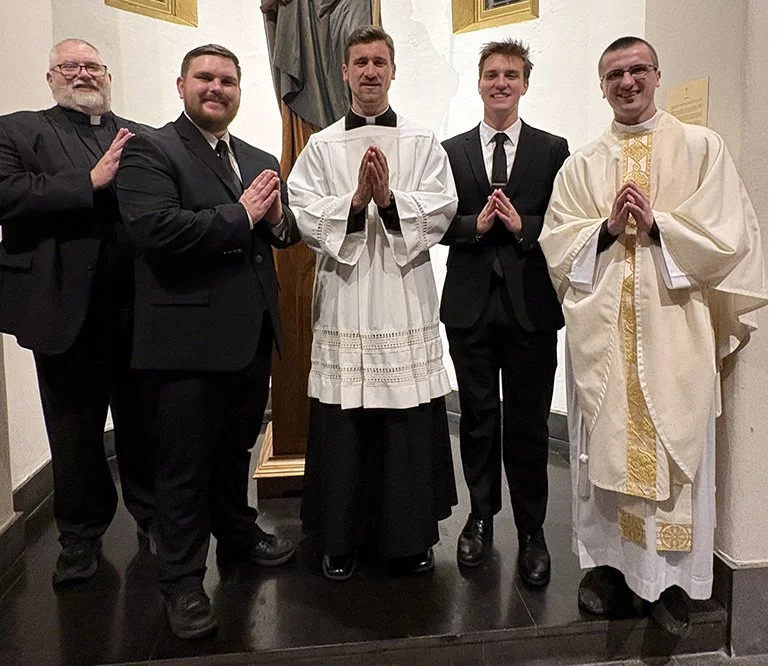
SAINT PAUL - The Saint Paul Seminary celebrated the institution of 17 seminarians as acolytes on October 27, 2025. This event marks an important step in their journey toward priesthood, as it allows them to assist at the altar during Mass and care for the Eucharist outside of the liturgy. The role of acolyte prepares these men for deeper service in the Church. The seminarians include those from the Archdiocese of St. Paul and Minneapolis, as well as from the Dioceses of Boise, Sioux Falls, Helena, New Ulm, La Crosse, and Saint Cloud, with one seminarian from Fargo. Among the newly installed acolytes is David Rabaey (Theo II), (center), a Diocese of New Ulm seminarian from the Church of St. Eloi in Ghent.. He stands alongside fellow New Ulm seminarians Brent Sundve (Theo III), Matthew Collins (Pre-Theo I), Aaron Gnerer (College Sophomore), and Fr. Shawn Polman, the Deanery II Dean of Vocations for the Diocese of New Ulm.
Minnesota archdiocese to host ‘Vatican Unveiled’ exhibit at Mall of America
Posted on 10/16/2025 12:59 PM (Local News - Diocese of New Ulm)
ST. PAUL, Minn. (OSV News) — From Jan. 10 to Feb. 1, the Archdiocese of St. Paul and Minneapolis will host “Vatican Unveiled,” an exhibit of the largest collection of papal artifacts outside of Rome, in celebration of the archdiocese’s 175th anniversary.
The 19,000-square-foot exhibit — curated by Father Richard Kunst, a priest of the Diocese of Duluth — will be hosted at the Mall of America in Bloomington. Items will include a document with the second-oldest papal signature outside the Vatican and a Swiss Guard uniform, the archdiocese announced in a news release Oct. 6.
In a video announcing the exhibit, Archbishop Bernard A. Hebda extended the invitation “to a very special celebration of the 175th anniversary of the Archdiocese of St. Paul and Minneapolis. It’s called ‘Vatican Unveiled,’ and it is a special exhibit of the largest collection of papal and other artifacts outside of Vatican City, the home of the Catholic Church.”
Father Kunst, ordained in 1998, has said he grew up collecting items. Before his ordination, he was a staff member for the late U.S. Sen. Rod Grams, a Republican from Minnesota.
The priest has developed a deep knowledge of the items in the “Vatican Unveiled” collection and a “passion for telling their stories,” the archdiocese stated in the news release.
Father Kunst is the vocations director for the Duluth Diocese and a former columnist for The Northern Cross, a monthly diocesan newspaper in Duluth that ceased operations last November. The diocese recently announced in a Facebook post that it plans to publish The Northern Cross in a magazine format starting in December.
Josh McGovern is a reporter at The Catholic Spirit, newspaper of the Archdiocese of St. Paul and Minneapolis. This story was originally published by The Catholic Spirit and is distributed through a partnership with OSV News.
Join Bishop Zielinski in praying the #RespectLifeMonth Novena on the Hallow app!
Posted on 10/13/2025 08:16 AM (Local News - Diocese of New Ulm)
In recognition of October being Respect Life Month, each day a Catholic bishop of the United States will lead the nation in praying for an increase in the respect for human life.
New Ulm’s bishop, the Most Reverend Chad Zielinski will be leading Day 5 (Oct 26).
Download the Hallow app in the App/Play Store.
Sign up to receive the novena directly- https://www.respectlife.org/respect-life-month-novena
Area first responders gather for Blue Mass at St. Mary in New Ulm
Posted on 10/1/2025 13:59 PM (Local News - Diocese of New Ulm)
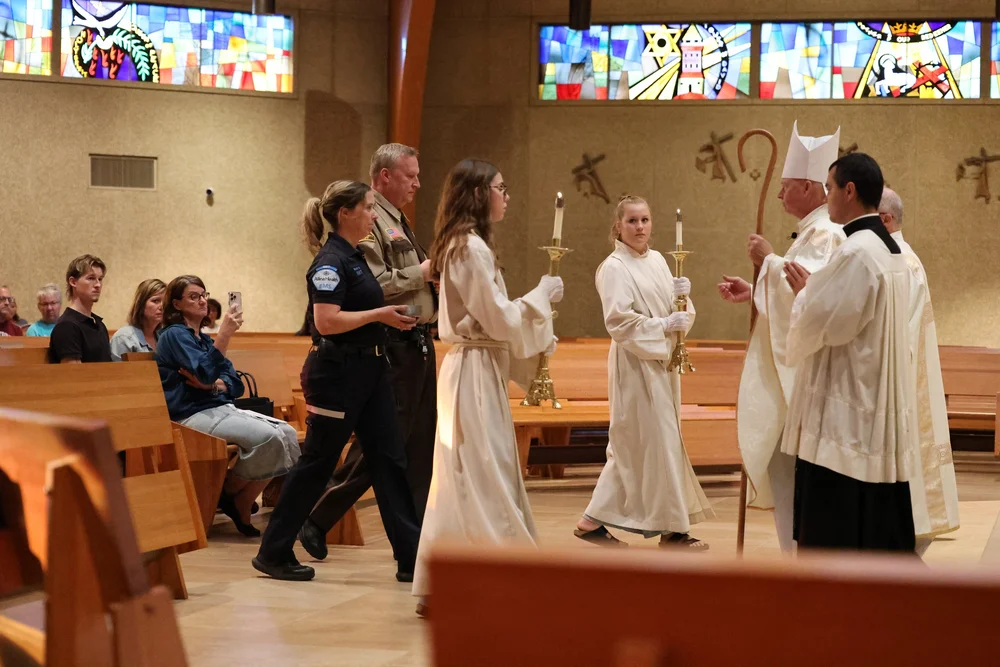
A Diocese of New Ulm sponsored Blue Mass was held Monday evening at the Church of St. Mary in New Ulm. The special Mass, celebrated by New Ulm’s bishop the Most Rev. Chad W. Zielinski, served as an opportunity for the community to honor those who protect and defend and remember those lost in the line of duty.
The Blue Mass coincided with the Feast of Sts. Michael, Gabriel, and Raphael, Archangels.
Bishop Zielinski - a military veteran.
After graduating from Alpena High School in 1982, he enlisted in the U.S. Air Force and while stationed in Idaho, attended Boise State College and Park College. At this time he felt a call to serve God as a priest. Having completed his tour of duty in 1986, he entered Mount Angel Seminary in St. Benedict, Oregon where he earned a bachelor’s degree with honors in Philosophy in 1989. He was accepted as a seminarian for the Diocese of Gaylord and entered Sacred Heart Major Seminary in Detroit to complete his spiritual formation and theological studies, receiving his Master of Divinity degree in 1996. He was ordained to the priesthood by Bishop Patrick R. Cooney at St. Mary Cathedral in Gaylord on June 8, 1996.
Following the terrorist attacks of 2001, future Bishop Zielinski felt a special tug on his heart to serve God by ministering to the men and women who protect our country. Aware of the great need for Catholic military chaplains, Bishop Cooney released him to serve in the Archdiocese for the Military Services. In 2002, he began his chaplaincy at Grand Forks Air Force Base in North Dakota. From 2003 to 2005 he was stationed in Suffolk, England, before returning to the U.S. and being assigned to HQ Air Force Recruiting Service at Randolph Air Force Base in Schertz, Texas. In 2009, Bishop Zielinski was appointed Roman Catholic Cadet Chaplain at the U.S. Air Force Academy in Colorado Springs, Colorado. In 2012 he was called to Alaska to serve as Chaplain to the 354th Fighter Wing at Eielson Air Force Base in Fairbanks, where he was contacted by the Apostolic Nuncio telling him of the Pope’s decision that he serve as the Bishop of the Fairbanks diocese.
In the course of his military career, Bishop Zielinski served three tours of duty in war zones, including Iraq and Afghanistan. “I guess the Church has prepared me for the military and the military has prepared me for the Church,” he wrote. “We receive orders and we go, whether coming from a general or the Pope.” He has received numerous military awards and decorations for his service, and was promoted to the rank of Major in July of 2013. Bishop Zielinski served two years in the Reserves at Eielson Air Force Base and retired on January 1, 2017 as a Major.
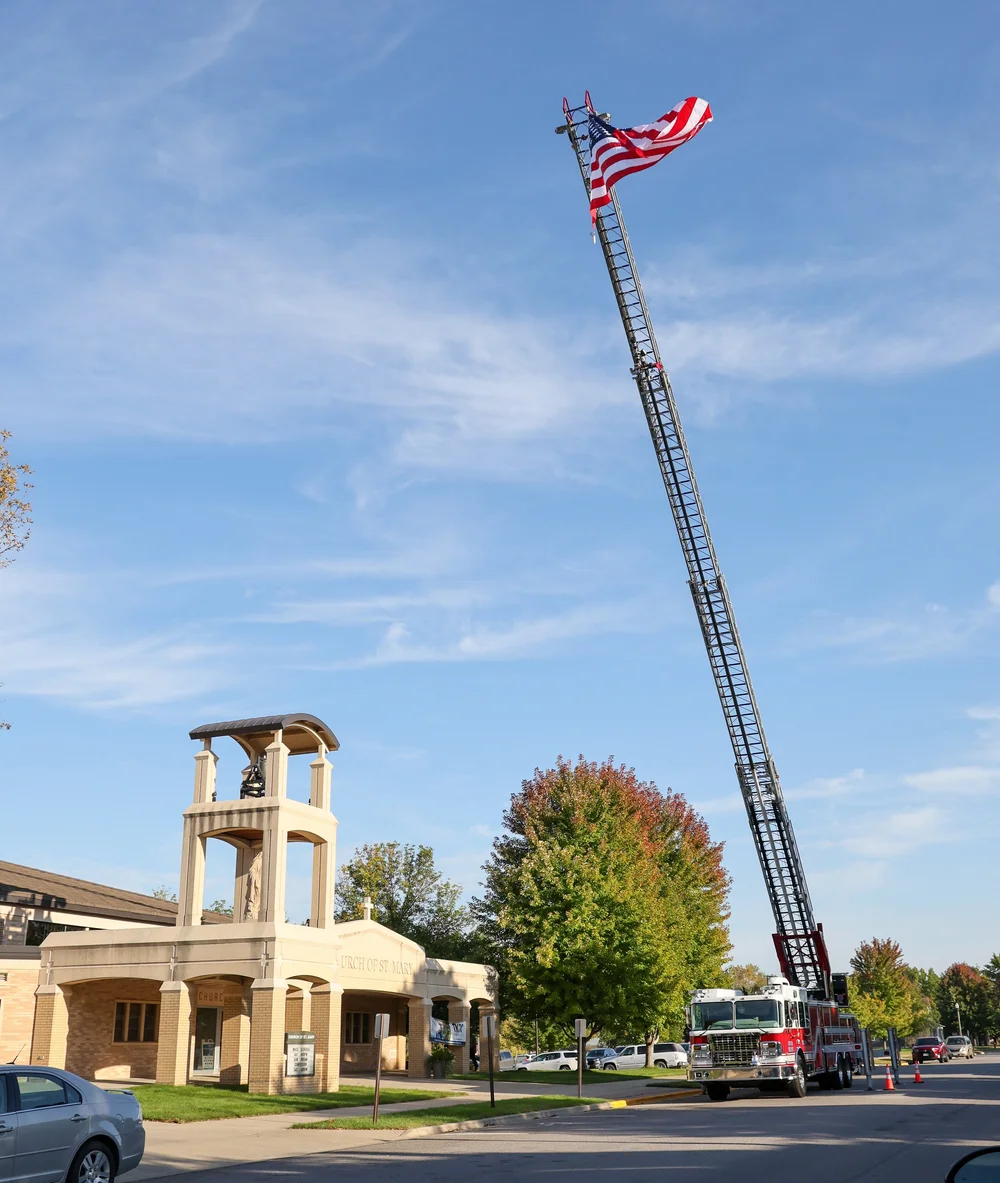
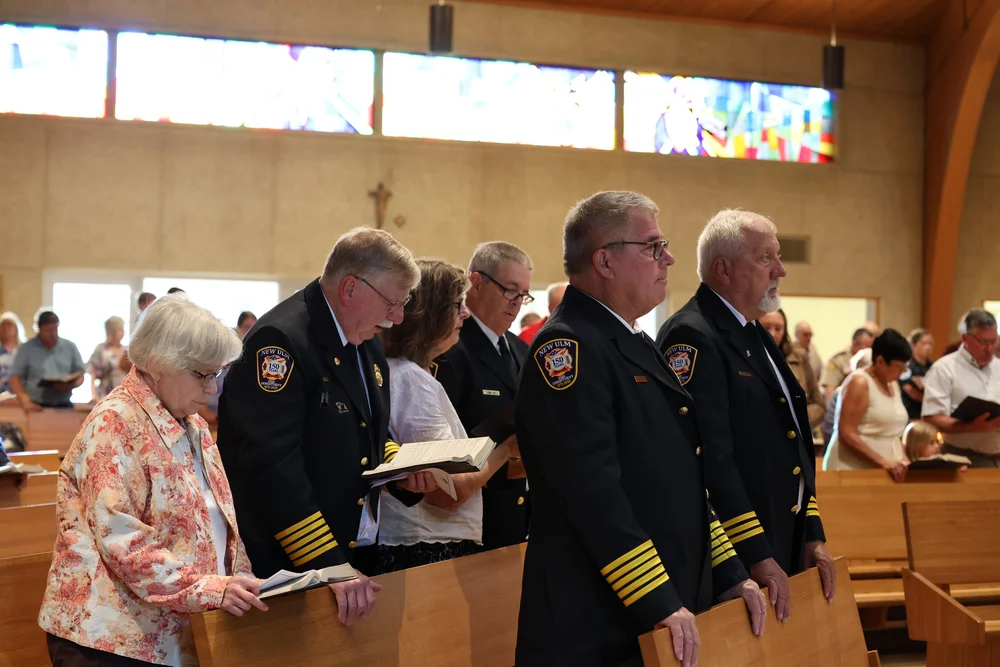
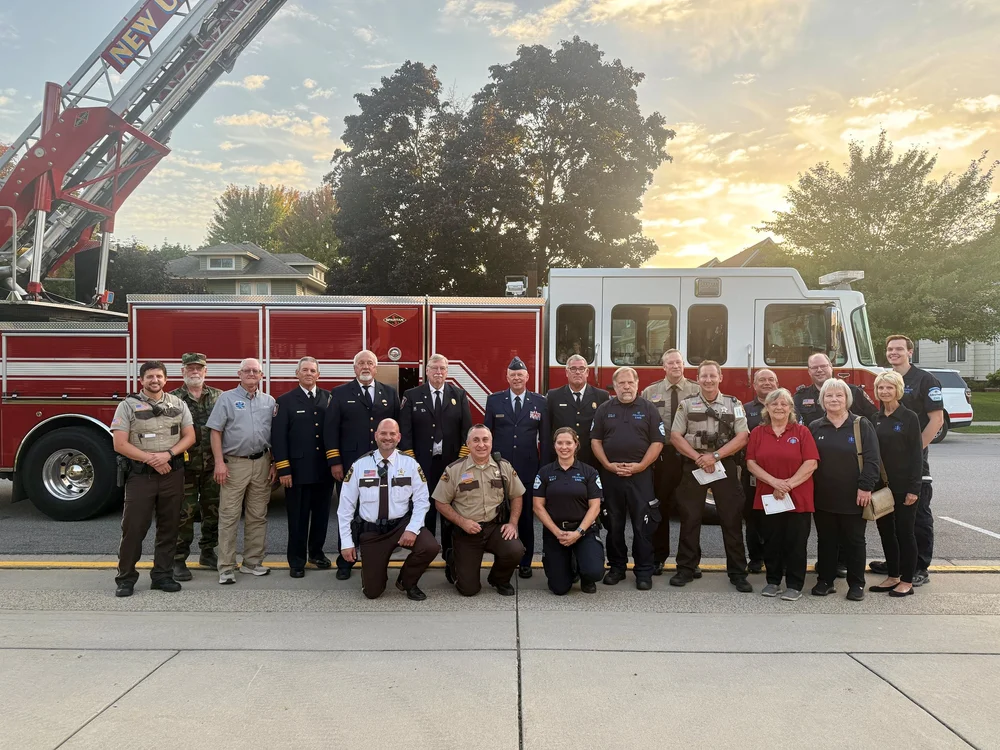
Statement from MCC Executive Director Jason Adkins on Calls for a Special Session to Address Gun Violence
Posted on 09/5/2025 16:30 PM (Local News - Diocese of New Ulm)
Saint Paul, Minn. – On Friday, September 5, 2025, Jason Adkins, Executive Director of the Minnesota Catholic Conference, issued the following statement in response to calls from Governor Tim Walz to reconvene a special session of the Legislature to address gun violence in the wake of the Annunciation Church tragedy:
In the wake of the tragic shooting at Annunciation Catholic Church and School, the Minnesota Catholic Conference (MCC) welcomes a broader legislative discussion about preventing gun violence. While a special session focused only on gun regulation may address part of the problem, it is insufficient if it ignores other urgent concerns, particularly equitable school safety funding for all students, including those in nonpublic schools.
The Catholic Church in Minnesota has long supported common-sense gun regulations, such as protective orders and expanded background checks. But these latter two laws did not prevent the Annunciation tragedy. Reasonable conversations can and should be had about regulating certain types of weapons and high-capacity magazines, which have little value outside a military context.
Americans have a right to possess firearms, whether for the purpose of hunting or for self-defense. But in a properly functioning society, these rights also come with responsibilities. Public safety demands thoughtful limits on gun ownership that allow communities to live without fear of violence at church, school, or in daily life.
At the same time, limiting the gun violence problem to the questions of guns merely masks the root causes of violence that are exacerbated by other policies. Public officials must enforce existing gun laws to keep dangerous individuals off the streets, while also addressing the deeper causes of violence—mental health struggles, family breakdown, and a growing despair often worsened by harmful ideologies, substance abuse, and the effects of the absence of God in people’s lives.
The Minnesota Legislature needs to look at those broader questions, including a reconsideration of recently enacted legislation that makes our state an incubator for the potential harm flowing from THC usage and from the widely debated treatment of young people experiencing gender dysphoria.
Certainly, not all these matters can be adequately addressed during a short special session where legislators must find common ground for the common good, but they are all factors for which there must be a reckoning.
Ultimately, true gun-violence prevention requires both laws and the courage to confront cultural and spiritual challenges that endanger our communities and children. With Pope Leo XIV, we pray for an end to the “pandemic of arms,” and urge lawmakers to pursue practical, holistic solutions that protect lives and strengthen families. Only then can we begin to repair a broken world marked by sin and suffering and move closer to the day when violence will be no more.”
Statement from Bishop Zielinski on Annunciation School Shooting
Posted on 08/27/2025 16:44 PM (Local News - Diocese of New Ulm)
Statement of U.S. Bishops' Vice President on Shooting at Annunciation Catholic Church in Minneapolis
Posted on 08/27/2025 13:29 PM (Local News - Diocese of New Ulm)
"Let us all beg the Lord for the protection and healing of the entire Annunciation family.”
WASHINGTON – In response to the shooting at Annunciation Catholic School in Minneapolis, Minn., Archbishop William E. Lori, vice-president of the U.S. Conference of Catholic Bishops issued a statement.
“As a Church, we are following the tragic news from Annunciation School in Minneapolis with heartbreaking sadness. Whenever one part of the Body of Christ is wounded, we feel the pain as if it were our very own children. Let us all beg the Lord for the protection and healing of the entire Annunciation family.”
